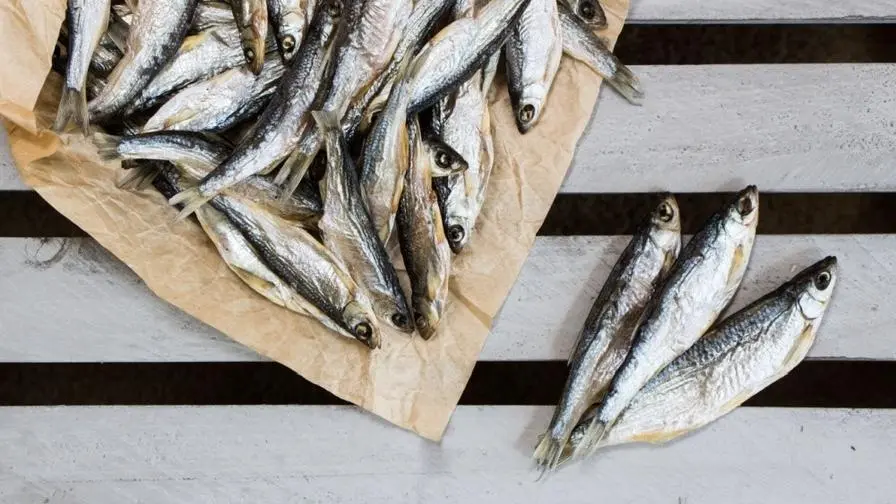Eating dried fish not only helps supplement calcium! Japanese study shockingly reveals: It is expected to reduce cancer mortality by 32%

Many documents have confirmed that eating fish in moderation is good for your health. If you only supplement “small fish” in your life, will the benefits be the same as eating salmon, mackerel and other fish? A Japanese study published in “Public Health Nutrition” confirmed that consuming small fish food 1-3 times a week is expected to reduce all-cause mortality and the risk of death from cancer.
Can eating “small fish” help reduce the risk of death? Japanese study: Cancer death rate dropped by 32%
This research was initiated by Nagoya University, Japan. The research team recruited 80,802 subjects aged between 35-69 years old from the Japan Multi-Institutional Collaboration Cohort (J-MICC). The team divided the subjects into four groups based on their frequency of eating small fish: almost never eating small fish, eating small fish 1-3 times a month, eating small fish 1-2 times a week, and eating small fish every week. (Inclusive) 3 or more small fish.
During the nine-year follow-up period, a total of 2,482 subjects died, approximately 60% (1,495) of whom died from cancer. The research team calculated the impact of small fish ingestion frequency on all-cause mortality, cancer mortality, cardiovascular mortality, and mortality from other causes. In this study, the lowest frequency of small fish intake (almost no eating) was considered the control group.
After the research team adjusted for potential variables such as age, BMI, smoking or drinking habits, education level, physical activity, history of high blood pressure, and JDI score (Japanese Diet Index, Japanese Diet Index), the analysis results showed that each week Consuming one to three servings of small fish is associated with a reduced risk of all-cause mortality and cancer mortality, with women benefiting more significantly than men.
Specifically, the relationships between small fish intake and all-cause mortality for men and women are as follows:
Those who consume small fish 1-3 times a month have a 19% and 32% lower risk respectively than those who barely consume it.
Ingesting small fish 1-2 times a week reduces the risk by 16% and 28% compared to those who hardly eat at all.
Ingesting small fish three or more times a week, compared with those who barely ingested it, the risk for women decreased by 31%; for men, no correlation was observed.
As for the relationship between small fish intake and cancer mortality, no significant correlation was observed for men, while the relevant data for women are as follows:
Those who consume small fish 1-3 times a month have a 28% lower risk than those who barely consume it.
Those who consume small fish 1-2 times a week have a 28% lower risk than those who barely consume it.
Those who consume small fish three or more times a week have a 35% lower risk than those who barely consume it.
What are the specific benefits of consuming small fish? “Four major nutrients” may be the key to fighting cancer
Study author Dr. Kasahara Chinatsu further explained that the study results show that the frequency of women’s intake of small fish is inversely related to all-cause death and cancer mortality; the impact on men is not significant. Additionally, no significant correlation was observed between the frequency of small fish ingestion and cardiovascular mortality in either men or women.
Dr. Kasahara believes that in the past, academic circles focused on the nutritional benefits of fish, mostly focusing on medium and large fish (such as tuna, mackerel or salmon). Now experiments have proven that regular supplementation of small fish is also beneficial to health. “Nutrition such as calcium, vitamins A and D, and n-3 polyunsaturated fatty acids in small fish may have a protective effect in reducing the risk of cancer.”
Dr. Kasahara gave an example. Vitamin A has antioxidant activity, can promote the production of detoxifying enzymes, and regulate cell morphogenesis, differentiation, and proliferation; vitamin D plays an anti-tumor role by inhibiting cancer cell proliferation and promoting cancer cell apoptosis. . n-3 polyunsaturated fatty acids inhibit cancer progression and metastasis by producing lipid peroxides and increasing cancer cell apoptosis.
Even eating “dried small fish” can help? “These 4 types” of small fish are extremely nutritious
A study published in “Nature Food” in March also confirmed that the contents of calcium, iodine, iron, omega-3, vitamin B12 and vitamin A in wild small fish are higher than those in salmon. Dr. Kasahara suggested that you should eat more fish such as mackerel, capelin, Japanese smelt, and sardines on a daily basis; moderate intake of dried fish that has not been over-processed or seasoned is expected to provide the same benefits.
However, Dr. Kasahara said that although this study has the advantages of large sample size, prospective design, and adjustment for various confounding factors, it still has its limitations, such as not taking into account changes in the subjects’ diet and living habits, potential The confounding factors cannot be completely eliminated, the number of cardiovascular death events is insufficient, and the study area is limited to Japan, so the results are not generalizable. Future larger-scale, multi-national and multi-ethnic studies are needed to clarify the relationship between the intake of small fish and reduced risk of mortality.
Source:
Wild fish consumption can balance nutrient retention in farmed fish
Extended reading:





